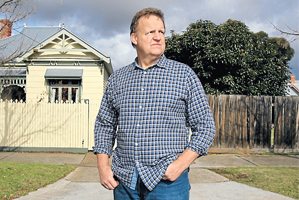RESIDENTS may soon be unable to object to developments in their area under controversial new planning laws aimed at speeding up permit applications.
Planning Minister Matthew Guy said the state government would immediately proceed with key reforms to slash planning red tape and save time on “low-impact developments”, as recommended by the Victorian planning system ministerial advisory committee.
Under the changes, neighbours would lose appeal rights and would not be notified of low-scale developments. Councils, residents and heritage groups have expressed fears of a diminishing of community character.
Moorabool mayor Pat Griffin said heritage and character were important to historical towns like Bacchus Marsh, and the new laws would give developers the ultimate power.
He cited the recent rejection of a townhouse development in Bacchus Marsh’s Lerderderg Street, which features many period homes but has no heritage overlay, as an example of the importance of residents’ rights.
In June last year, the council, taking into consideration residents’ objections, rejected a permit for two double-storey, modern townhouses on the corner of Lerderderg and Young streets. In November, the Victorian Civil and Administrative Tribunal upheld the decision, concerned the development would not be in keeping with the neighbourhood’s older, single-storey homes.
Applicant Steven Keith, director of Melbourne Building Group, altered a facade and building materials, decreased house sizes and resubmitted the proposal to council. It again rejected the plans on April 18, citing neighbourhood character concerns.
Lerderderg Street resident Ron Geurts applauded the council and residents who objected in order to preserve heritage benchmarks for the town. He said the council received 36 objections received to the plans even though only 10 notices were sent to nearby residents.
Mr Geurts said he feared the new laws would allow such developments to go through “unchecked”. “[Developers] keep a town alive, but we want developments that maintain the character of the town.”
Mr Keith said although the appeal processes could be lengthy, he believed residents should have a right to object and appeal.
“As a developer, sometimes objections bring to light issues that you wouldn’t have otherwise seen. It plays a big part in what we do, ” he said.
“Even though we’re going through a bit of trouble in this case, there should still be a solid system in place.”
Mr Keith said he wasn’t sure if the company would appeal the new rejection. It might instead look to renovate the existing property.
“We are not here to upset people,” he said.
Opposition planning spokesman Brian Tee said the proposed changes would give developers “free rein”.
But Mr Guy said the legislation had been misunderstood by the media and heritage groups.
“People are not understanding the legislation. The government has been very clear this will only affect low-impact developments like fences or garages … the whole basis of it is to empower councils.”







